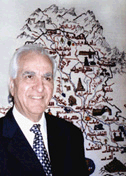Tourism Peace
"Peace is relevant to our topic as there is no tourism without peace. Many governments have realized the importance of tourism to their economic well being and the role that tourism plays in understanding between nations. It is the best advertisement for a country’s culture and heritage. But tourism does not flourish without peace in all its forms. The concept is not limited to ‘political peace’.
Two of God’s greatest gifts, health and peace are seldom appreciated. An Arab saying tells us that good health is like a crown whose value is only fully understood by the sick.. The concept of peace is more abstract and elusive and has to be analysed.
It has been stated in the Koran that when prophet Ibrahim took his wife Hagar and his son Ismael to the holy land, Macca, he said a prayer: “My Lord, make it a secure town” (2: 126). God had answered his prayers and he gave this country the highest grace, peace. God said to Quresh, the tribe of the prophet: “So let them serve the Lord of this House. Who feeds them against hunger and gives them security against fear” (106: 2-4) God described those who disturb the peace as “Acting corruptly in the land ” (See 2: 60) and he proscribed the most extreme punishment for them. Many verses in Koran and various Hadiths have emphasised the importance of peace.
Peace is relevant to our topic as there is no tourism without peace. Many governments have realized the importance of tourism to their economic well being and the role that tourism plays in understanding between nations. It is the best advertisement for a country’s culture and heritage. But tourism does not flourish without peace in all its forms. The concept is not limited to ‘political peace’.
Peace is a vital component of the tourism industry. Without it there is no tourism because no one travels unless peace prevails. To do otherwise would be sheer madness.
The perplexing question is whether the state of anarchy enables hooligans and criminals to thrive or are these people responsible for creating a state of anarchy and chaos. We include here organised and non-organised crimes and even crimes of individuals committed due to their lack of self control. Such problems are not restricted to a given society; they are prevalent even in free, democratic states with a social security system. The problems manifest themselves in negative behaviour such as robbery, theft, aggression, fraud, exploitation and other modern phenomena.
There are many reasons for the breakdown of peace and security. The problem cannot be solved simply by throwing money at it. Even when a state puts all its human and material resources, such as technology, a security apparatus, armed guards and intelligence agents, into ensuring peace and security, the problem is not solved. The provision of every tourist group with armed guards does not guarantee tranquillity and peace of mind.
There are other problems that create an atmosphere of discomfort and apprehension such as the lack of traffic regulations or disrespect for the rules of the road which poses great danger. Norms of civilised behaviour are not adhered to when people refuse to queue, start quarrelling and fighting and even killing each other. A lack of cleanness, especially in public places, embarrasses tourists and locals.
Tourism peace can be disrupted by internal and external factors. Openness to the external world has its advantages but also means exposure to people who are not interested in peace and foment trouble. They engage in immoral and inhuman behaviour which flies in the face of values cherished by nations eager to welcome visitors.
The diseases that disrupt tourism cannot be treated or cured with medicines, operations or emergency surgery. It is essential to develop an immunity to them. Isn’t immunity better than cure?
So, how could states and nations immunise themselves against these dangers, especially those which affect tourism? It is usual to unjustly blame states and government which are nothing more than external structures. Attention must be paid to the infrastructure: civil society with its numerous organisations can play a vital role. The organisations of civil society must stand together and protect the peace from within society. Then the external, regulatory role of the state comes into play. There is a new trend that calls for holding conferences and symposiums on the official level to tackle the problem of security.
In most Islamic countries we have become used to the state playing a repressive role in these matters. But repression did not solve the problem – it only makes it worse. The issue of peace and security is wider than the problem of violence. Violence is the most obvious manifestation of the problem but a radical solution must be found to the whole issue of anti-social behaviour.
The state has to promote a civilised way of living through its laws and regulations so that it will be able to receive visitors and tourists coming from outside the country or local visitors and communicate effectively with them. It has to raise awareness about responsible tourism through all the media at its disposal on the local, regional and international level. It also has to encourage the formation of professional unions in all sectors, specially those related to tourism. These organisations must be given the responsibility of informing their members about laws and regulations, especially those related to security matters.
The state must also explain to different organisations their security responsibilities towards those who are working or trading with them. It has to ensure that the infrastructure is adequate, hygiene standards are adhered to and traffic regulations are complied with especially when they relate to goods vehicles travelling between different cities and neighbouring countries. The state also has to provide enlightened guidelines on the treatment of local, regional and foreign tourists.
All these organizations have to rely on security departments in extreme cases. These departments have to uphold the highest legal and moral standards when carrying out their duties to ensure peace in social sectors.
This is illustrated by the participation of organizations, societies and individuals in developed countries to ensure their safety and the safety of others:
• To reduce the problem of illegal immigrants most countries place the responsibility on the airlines to ensure their passengers have adequate papers or visas. Heavy fines are imposed for each illegal immigrant carried by an airline. These laws may be enforced with the help of the IATA which regulates air travel. Pressure on the security apparatus at the air port has been reduced because of this practise and life has been made easier for other passengers.
• Most communities agree on a plan to protect their residential areas through a neighbourhood watch scheme. The residents keep an eye on strangers and put a “Neighbourhood Watch” sign in their windows. This tells suspicious strangers that they are not welcome even if no one is watching them.
• Security guards working in residential building, companies and organizations are trained properly and they are given the appropriate means of communication to preserve the peace not just at their place of work but in the community as a whole.
It is not necessary for anyone who tries to keep the peace to carry arms or use force. Preserving the peace could be the job of everyone, young or old. Any home can be secure: , in cases of domestic violence a child can phone the police who will respond to the call in all seriousness. Thousands of lives have been saved through these calls. Fortunately hoax calls do not affect the resolve of the peace keepers.
In conclusion, governments have to help societies and their organizations in keeping the peace and they must provide all the required resources, including a security apparatus that is ready to answer calls where protection and rescue is required. This responsibility is also shared by unions, professional chambers, organizations, political parties, schools and mosques. All these organizations must have a role in creating an atmosphere of peace and change negative behaviour into positive practises such as respect for cleanness. This will give society a civilised image. Citizens have to be instructed about how to communicate with tourist and exchange useful experiences with them to create understanding, tolerance and bridge the gap between nations.
When peace prevails tourism flourishes and nations become more enlightened and are presented with greater opportunities to meet and understand each other. This will help combat misunderstanding, hatred and quarrels.
In the words of the Quran: “We have created you of a male and female and made you nations and tribes, that you may know each other”.
May Allah guide us to the best of deeds.
A. S. Shakiry
|

